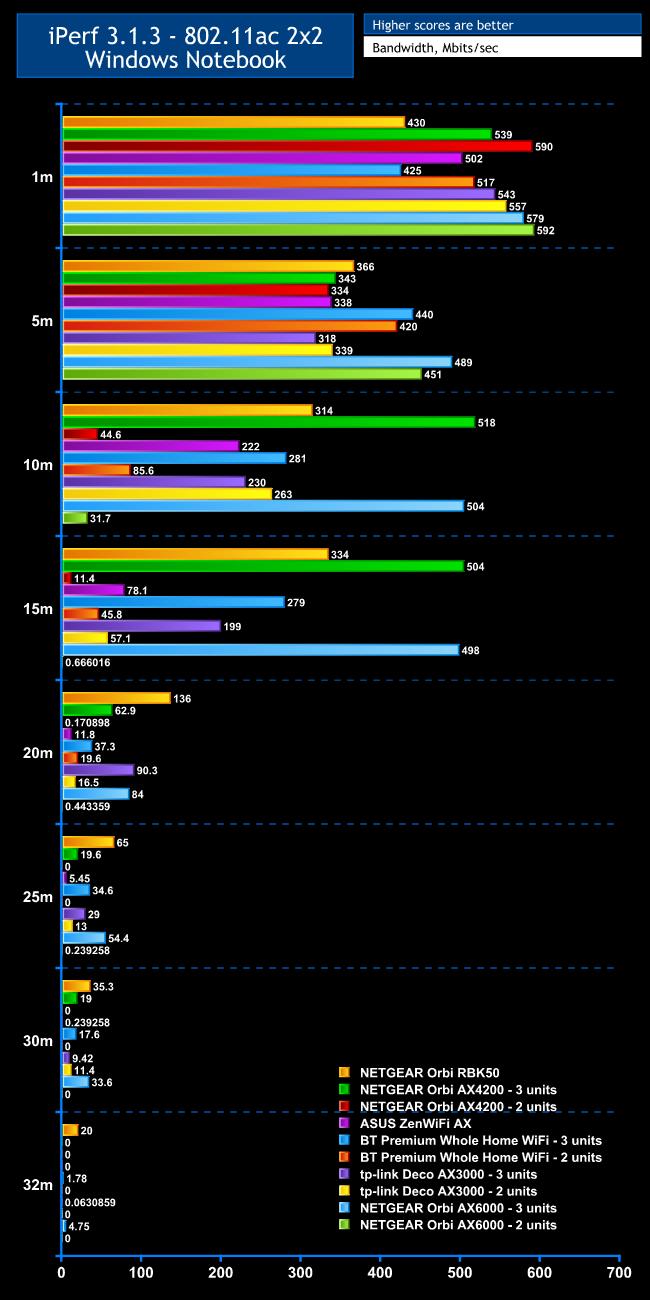802.11ac Results – 2×2 Windows Notebook
The picture is more varied with 802.11ac, aka WiFi 5.
As before, at 1m all the routers are doing well, with every single one providing more than 400Mbits/sec. The winner here is actually the NETGEAR Orbi AX6000 with two satellites, achieving 592Mbits/sec – faster than the original Orbi RBK50 / AC3000 which is starting to look pedestrian at this range. Coming in second is the AX4200 with 590Mbits/sec, then the AX6000 with two units at 579Mbits/sec. The tp-link Deco AX3000 with two units is fourth, with 557Mbits/sec. However, tp-link still acquits itself well with three units, managing 543Mbits/sec, and a three-unit setup of NETGEAR's Orbi AX4200 is doing admirably with 539Mbits/sec. We can't criticise the ASUS ZenWiFi AX's 502Mbit/sec. The only surprise is that BT only manages 425Mbits/sec with three units, whereas it can provide 517Mbits/sec with two.
There is already noticeable drop-off at 5m, although all products are still managing over 300Mbits/sec. Top of the pile at this range are the NETGEAR Orbi AX6000 (489Mbits/sec with three units and 451Mbits/sec with two) and BT Premium Whole Home WiFi with three units, which manages 448Mbits/sec. The latter also does well with two units, managing 420Mbits/sec. NETGEAR's original RBK50 remains a contender with 366Mbits/sec, whereas the new AX4200 is a little behind, delivering 343Mbits/sec with three units and 334Mbits/sec with two. ASUS's ZenWiFi AX is in the same ballpark at 338Mbits/sec. However, tp-link has seen the greatest fall, to 318Mbits/sec with three units and 339Mbits/sec with two.
We're really starting to see some differentiation at 10m, where the NETGEAR Orbi AX4200 with three units reigns supreme at 518Mbits/sec – clearly the WiFi 6 backhaul has kicked in. Likewise, the AX6000 with three units is close by at 504Mbits/sec. Conversely, performance with two units is terrible, only managing 44.6Mbits/sec for the AX4200 and 31.7Mbits/sec for the AX6000. ASUS's ZenWiFi AX is still delivering a commendable 222Mbits/sec, but BT is starting to show the benefits of a three-unit mesh over just two units. With three satellites, you're still getting a commendable 281Mbits/sec, but this drops to just 85.6Mbits/sec with two. The odd performance we saw from tp-link is resurging, with 230Mbits/sec with three units but a higher 263Mbits/sec with two.
As before, 15m is where three-unit mesh begins to show its abilities. The three-unit NETGEAR Orbi AX4200 is still delivering 504Mbits/sec, whereas with two units it's only delivering 11.4Mbits/sec. Likewise, the Orbi AX6000 is providing 498Mbits/sec with three units, but an unusable 0.67Mbits/sec with two. Similarly, BT is managing 279Mbits/sec with three units but just 45.8Mbits/sec with two, while tp-link is providing 199Mbits/sec with three units and 57.1Mbit/sec with two. ASUS's ZenWiFi AX is managing a decent 78.1Mbits/sec, showing that it has a strong signal but is let down by only having two units. NETGEAR's original RBK50, also a two-unit configuration, is achieving a decent 334Mbits/sec.
The 20m results further underline this trend. The three-unit NETGEAR Orbi AX4200 is managing a usable 62.9Mbits/sec, but with two units the signal is there but too slow to use. The AX6000 is delivering 84Mbit/sec with three units, but is also unusable with two. BT is delivering 37.3Mbits/sec with three units but a more pedestrian 19.6Mbits/sec with two. The tp-link result of 90.3Mbits/sec with three units is surprisingly good, but this drops to 16.5Mbits/sec with two units. ASUS's ZenWiFi AX is providing a just-about-viable 11.8Mbits/sec. NETGEAR's original Orbi RBK50 is top of the pile with 136Mbits/sec.
At 25m only a few configurations are still viable. NETGEAR's original RBK50 is one, with 65Mbits/sec, and BT Premium Whole Home Wi-Fi is another with 34.6Mbits/sec, although with two units there is no longer a signal at this range. The three-unit Orbi AX6000 is providing a very capable 54.4Mbis/sec, but just 0.24Mbits/sec with two. The tp-link system with three units is also managing 29Mbits/sec, and a still usable 13Mbits/sec with two units. NETGEAR's Orbi AX4200 is also usable with three units, delivering 19.6Mbits/sec, but it has lost signal with two units. ASUS's ZenWiFi AX is holding on by its fingernails, delivering 5.45Mbits/sec.
At 30m, the story continues but with lower speeds. The venerable NETGEAR Orbi RBK50 is managing the best throughput with 35.3Mbits/sec, the Orbi AX6000 with three units 33.6Mbits/sec, and the Orbi AX4200 with three units is also usable with 19Mbits/sec. BT with three units is usable too, delivering 17.6Mbits/sec. The tp-link with two units has strangely surged ahead of its three-unit configuration, delivering 11.4Mbits/sec and 9.42Mbits/sec respectively – marginal but not out of the running just yet. ASUS's ZenWiFi AX is still getting a signal, but not really enough for comfortable Internet access.
With our gruelling 32m “behind the shed” test, only the original NETGEAR Orbi RBK50 is delivering a usable 20Mbits/sec. The three-unit Orbi AX6000 is providing a marginal 4.75Mbits/sec. Everything else had either lost signal or was delivering performance too low to be used. BT with three units was the best of the bunch at 1.78Mbit/sec, but that's only going to give you Internet speeds circa the year 2000, which will probably mean most modern websites are too slow to view.
Overall, it looks like none of the new WiFi 6 contenders has surpassed the original NETGEAR 802.11ac kit for performance with clients using the venerable WiFi 5 standard. We should point out, however, that the NETGEAR Orbi RBK50 was originally tested with the second unit at position S2 (see How We Tested) rather than S1, which clearly helped it with range. Of the WiFi 6 kit, NETGEAR's Orbi AX6000 with three units is providing the most usable range, and the AX4200 is close, although BT with three units is also to be commended for doing nearly as well, and tp-link is about 5m shorter.
 KitGuru KitGuru.net – Tech News | Hardware News | Hardware Reviews | IOS | Mobile | Gaming | Graphics Cards
KitGuru KitGuru.net – Tech News | Hardware News | Hardware Reviews | IOS | Mobile | Gaming | Graphics Cards



